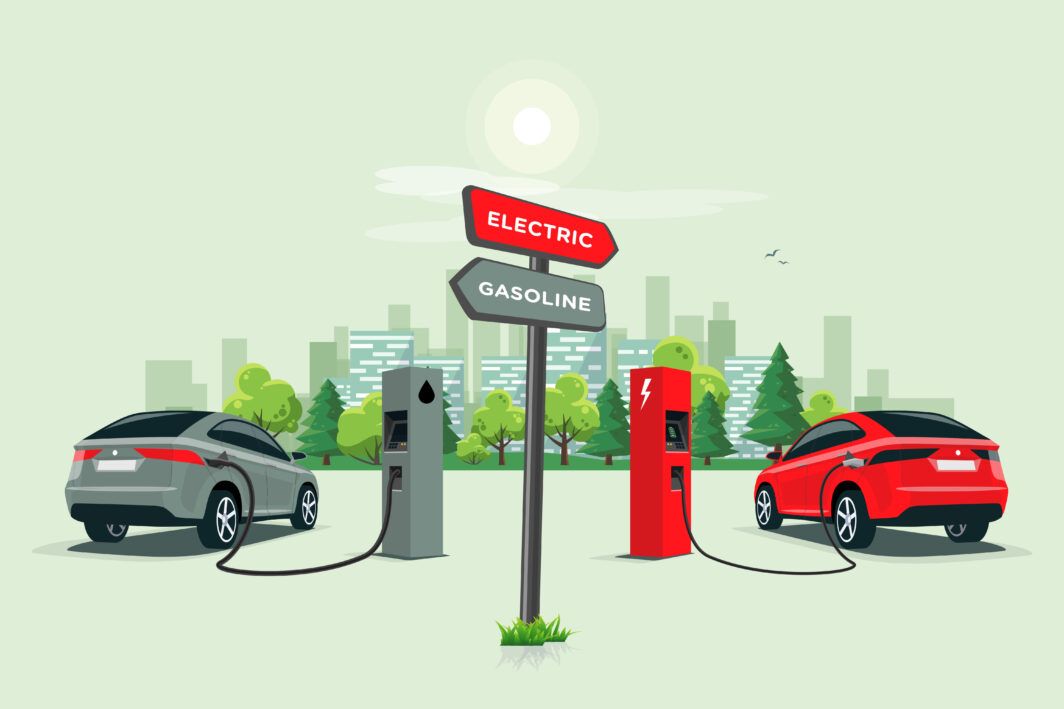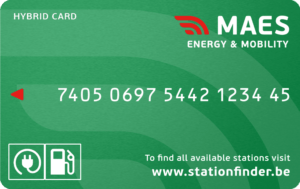
Electric charging with MAES
Here you can find all useful information about electric charging
Fully electric or hybrid? Which car suits you best?
Fully electric or hybrid car? Are you in doubt about purchasing a new car? But don’t know what suits you best? A fully electric car (EV) or hybrid car (HEV-PHEV)? Then you can find some important points below that can help you make the decision!
What are the different types of vehicles?
Which of the two depends on your specific wishes and needs. It is of course important to know the difference first. You have 3 types: Hybrid, plug-in hybrid & electric vehicles.
- Hybrid car (HEV – Hybrid Electric vehicle): This has been around for a while and is a car that is powered by the combination of a combustion and electric engine. The electric motor supports the combustion engine. This jumps in when you accelerate strongly, overtake, accelerate or drive up a hill. Moments where you can use that little extra. So you use less fuel and enjoy better performance when accelerating. The system recovers energy through ‘regenerative’ braking. This means that the energy released during braking is captured and used to charge the battery while driving. So you never have to plug in a hybrid. With some models it is also possible to drive only on the electric motor to a limited extent, but for very limited distances.
- Plug-in hybrid (PHEV – Plug-in hybrid electric vehicle): The big difference with the above is that it has a much larger battery, which you have to charge. These cars have a much larger electric range and you can therefore also drive fully electrically. When the battery is empty, you can still fall back on the traditional combustion engine.
- Electric (EV – electric vehicle/BHEV – battery-powered electric vehicle): A fully electric car then no longer has a traditional combustion engine. This car is the newest of these 3 types of vehicles, but has also been on the market for a while.
Important factors to consider
Below you can find some factors to consider when deciding between a fully electric or hybrid car.
Charging infrastructure
Be sure to check if there are charging points nearby or see if you can charge at home and at work. You can go here for public charging points. If charging at home is not an option for you or at work and you don’t have too many charging points in the area, then a hybrid car is probably the best choice because they have a petrol engine that you can use anywhere. If you do have sufficient charging options, you can of course look at a PHEV or EV car. Did you know that you can now also contact MAES for ultra-fast charging points? The intention is that you (depending on your car) are good for hundreds of kilometers within 10 to 20 minutes to continue your journey back!
Price
For many people this is often the deciding factor. Not everyone has such a budget where the price is not really important. Fully electric cars are usually more expensive to purchase than a comparable hybrid. They do have fewer moving parts and no combustion engine, so they are cheaper in terms of maintenance. The decisive factor in terms of budget may well be the fuel cost. This factor was often one of the push factors to go for an electric car, but thanks to the recent energy crisis, it is best to check all prices first. Can you charge at home and do you have solar panels? Then this may be cheaper for you, can you only charge at public charging points? Then a hybrid car may be cheaper at the moment. So be sure to take the time to see what it means for you in the long term!
Environmental awareness
If (local) environmental protection is a high priority for you, then a fully electric car may be the best choice as they do not produce exhaust fumes and rely on clean energy sources. But don’t blindly fall into the trap here either. Here you can also look at the entire process of such a car, from extraction of the materials to demolition.
Distance you travel daily
Always cover short distances and if you don’t need to be on the track all the time, a fully electric car might be a good choice for you. If you are always on the road for work, for example, or if you like to travel to slightly less touristy areas, a fully electric car is still a risk at the moment. A plug-in hybrid or regular hybrid car can still be the safest option to stop anywhere.
In general, plug-in hybrids are a compromise between the advantages of fully electric cars and the security of petrol cars, while fully electric cars are the future with a lower environmental impact and, until recently, lower fuel costs. It is important to consider what best suits your specific needs and wishes.
All useful information about electric charging with MAES can be found here.
FAQ
How much power do I need to charge my electric car?
The power required to charge an electric car depends on the capacity of the battery and the charging speed of the charging point. In general, the larger the capacity of the battery and the faster the charging speed, the higher the power required. An average electric car has a battery capacity of about 60 kWh and can be charged from 0 to 100% in about 8 hours with a charging speed of 7.4 kW. For faster charging speeds, for example at a fast charging station, higher power is required.
Can I charge my electric car at home?
Yes, most electric cars can be charged at home using a charging station or a regular socket.
Is it safe to charge an electric car?
Yes, it is safe to charge an electric car. Electric cars are designed to be safe while charging, and most charging stations have protection mechanisms to prevent overload and short circuits.
How much does it cost to charge an electric car?
This depends on the price of the electricity and the capacity of the charging point. In general, charging an electric car is cheaper than refueling with petrol or diesel.
Can I charge my electric vehicle while driving?
At the moment it is not possible to charge an electric vehicle while driving, as wireless charging technology is still under development.
How do I pay for charging my electric vehicle?
This depends on the charging infrastructure and the payment method that has been set up. For example, you can pay with a charge card (such as the handy MAES Hybrid card), via an app or via a credit card.
Where can I charge my electric car?
You can charge your electric car at public charging points, at fast charging stations, at home or at work.
What is the range of an electric car?
The range of an electric car depends on the capacity of the battery and the consumption of the car. On average, electric cars have a range of 200 to 300 kilometers.
